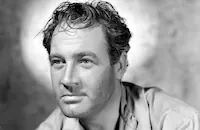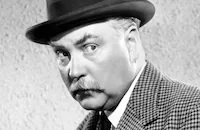Jalna

Brief Synopsis
Cast & Crew
John Cromwell
Kay Johnson
Ian Hunter
C. Aubrey Smith
Nigel Bruce
David Manners
Film Details
Technical Specs

Synopsis
After he receives word that his first book of poetry is to be published by a New York firm, handsome Eden Whiteoaks leaves "Jalna," the Ontario estate he shares with Gran, uncles Ernest and Nicholas, brothers Renny, Piers, Wakefield and Finch and older sister Meg, for the city. There, Eden falls in love with and marries literary assistant Alayne Archer and returns to Jalna with her, just as Piers shows up with his bride, neighbor Pheasant Vaughn. Although Alayne is greeted warmly by the Whiteoaks, Pheasant, whose alcoholic father Maurice had been engaged to Meg until baby Pheasant was left on his doorstep, is denounced by Meg and everyone else in the family but Renny. At Renny's insistence, Pheasant, whom Alayne has also defended, is allowed into the household and soon attracts the attention of Eden. At the same time, Renny grows close to Alayne, deeply impressed by her beauty, poise and intelligence. Eventually, Renny and Alayne, having confessed their love for each other, decide to separate, and Eden is about to give in to Alayne's pleas that they move to New York, when he falls and breaks his leg during a family Christmas party. Following his prolonged recuperation, Eden seduces Pheasant at a family picnic and is seen by Finch. Envious of Eden, Finch tells Piers about his wife's adultery, and Piers storms off in a jealous rage to find Eden. Confronted by Piers on a high cliff, Eden, who had just planted a fake suicide note, slips and falls to his death. Two weeks later, as Alayne is about to leave for New York, the usually befuddled one-hundred-year-old Gran orders Renny to catch Alayne and marry her, while astutely encouraging Piers and Pheasant to reconcile with each other, and Meg and Maurice to forgive each other.

Director

John Cromwell
Cast

Kay Johnson

Ian Hunter

C. Aubrey Smith

Nigel Bruce

David Manners
Peggy Wood

Jessie Ralph

Molly Lamont
Theodore Newton
George Offerman Jr.
Clifford Severn

Halliwell Hobbes
Forrester Harvey
Crew
Larry Bachmann
Alberto Colombo
Edward Cronjager
Garrett Fort
Charles Kirk
Kenneth Macgowan
Elizabeth Mcgaffey
William Morgan
Walter Plunkett
Van Nest Polglase
Anthony Veiller
Earl A. Wolcott

Videos
Movie Clip




Film Details
Technical Specs

Articles
Jalna
The novel, first published in 1927, was the first in a sixteen-book saga about the Whiteoaks family that won de la Roche an international following, with the books being translated into many languages. In addition to the film, the series inspired stage, radio and television versions including a 1951 BBC television drama called Whiteoaks and a 1972 CBS-TV series called The Whiteoaks of Jalna. A French television production starring Danielle Darrieux appeared in 1994.
Cromwell's film begins as two Whiteoaks brothers marry and, on the same day, bring their brides back to Jalna, where the newcomers must adapt to life with this odd family. Gran (a mugging, scene-stealing Jessie Ralph) is the crafty, sharp-tongued, 99-year-old matriarch; the new grooms are black sheep Piers (Theodore Newton) and poet Eden (David Manners); the brides are Pheasant (Molly Lamont) and Alayne (Kay Johnson), the beautiful, warm-blooded American who sparks changes in the order of things.
Ian Hunter is Renny, the practical brother who runs the estate, C. Aubrey Smith and Halliwell Hobbes are bachelor uncles, Peggy Wood is the jilted spinster sister, Meg, and Nigel Bruce is the neighbor who has been in love with her for twenty years. Witnessing the family's jealousies, romantic conflicts and life-and-death intrigues is the butler/chauffeur, Rags (Forrester Harvey).
Junior Durkin, who had played Huckleberry Finn in two RKO films, was originally cast as younger brother Finch Whiteoaks. Durkin, however, was killed in an automobile accident and replaced by his friend George Offerman, Jr. The accident also took the life of actor Jackie Coogan's father, John Coogan, Sr., and two other people.
Although fast pacing and expert performances keep the film entertaining, a contemporary review in Variety did not deem Jalna a success: "On surface indications this story of Mazo de la Roche's would soon be destined for big business. It was one of the best-sustained sellers of its season and the fifth story in the Jalna series is even now clinging persistently to the bestseller lists... [but] the adaptor seems to have captured certain physical aspects without having been able to retain the poignant appeal of the book."
Jalna, a city in west-central India, was used by de la Roche as the name of the manor house in her novel, supposedly built by a retired officer of the British army who had served in that country. It resembles an actual house called Benares which is located in Mississauga, Ontario, and now operated as a city museum. It was once part of a larger estate, part of which de la Roche called home for a time.
Director Cromwell, who also acted in movies and on the stage, was known for the fluid work of his cinematographers, once commenting that flashy camerawork interfered with the performances of the actors. Director of photography Edward Cronjager gives Jalna a typically smooth look.
Cromwell was married at the time of filming to leading lady Kay Johnson, the first of his four wives. He was the father of actor James Cromwell. The director's other memorable films include Of Human Bondage (1934), Little Lord Fauntleroy (1936), The Prisoner of Zenda (1937), Algiers (1938), Abe Lincoln in Illinois (1940), Since You Went Away (1944), Anna and the King of Siam (1946) and The Racket (1951).
Producer: Kenneth Macgowan
Director: John Cromwell
Screenplay: Garrett Fort, Larry Bachmann (adaptation); Mazo de la Roche (novel); Anthony Veiller (screenplay)
Cinematography: Edward Cronjager
Art Direction: Van Nest Polglase
Music: Alberto Colombo (uncredited)
Film Editing: William Morgan
Cast: Kay Johnson (Alayne Archer Whiteoaks), Ian Hunter (Renny Whiteoaks), C. Aubrey Smith (Uncle Nicholas Whiteoaks), Nigel Bruce (Maurice Vaughn), David Manners (Eden Whiteoaks), Peggy Wood (Meg Whiteoaks), Jessie Ralph (Gran Whiteoaks), Theodore Newton (Piers Whiteoaks), Halliwell Hobbes (Uncle Ernest Whiteoaks), George Offerman Jr. (Finch Whiteoaks).
BW-78m.
by Roger Fristoe

Jalna
Quotes
Trivia
Notes
Mazo De La Roche's novel was published serially in The Atlantic Monthly (May-October 1927) and, according to screen credits, was the "Atlantic Monthly prize novel of Canadian life." In the closing onscreen credits, actors playing the Whiteoaks family are shown and their characters, identified. No other characters, however, were identified. RKO borrowed Ian Hunter from Warner Bros. for this production. According to Hollywood Reporter, George Offerman, Jr. replaced Trent Durkin in the role of "Finch." Film Daily announced that British actors Molly Lamont and John Wood were making their American screen debuts in the production. Wood's participation in the final film has not been confirmed. Kay Johnson was married to director Cromwell during the film's production.














